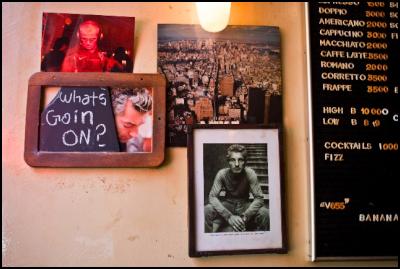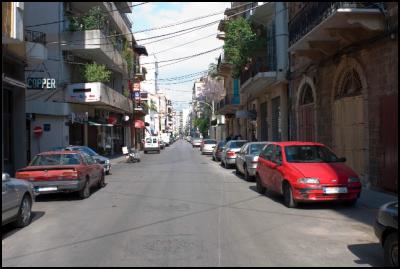Yasmine Ryan: More Nightmares In Beirut
More Nightmares In Beirut
So Lebanon, it would seem, is to be once again sacrificed on the alter of fuzzy geostrategic objectives. There are of course local enablers - on both sides - acting under the influence of their foreign backers.
In one corner we have the government, formed by an alliance of mostly Sunni, Druze and assorted Christian parties. Their major supporters? The U.S., Saudi Arabia, Egypt and France. In the other corner, the opposition consists of the two major Shi'a movements, a rebellious (and anti-Syrian) Christian group and a smattering of secular leftists. They are predominately supported by Syria and Iran. The Opposition, popularly known as the resistance, do not recognise the government.

Click to enlarge
Image by Tanya Traboulsi. A blackboard on the wall of the Torino Cafe, in the east Beirut suburb of Gemayze. Each week, the writing changes, depending on the mood in Lebanon.

Click to enlarge
Image by Tanya Traboulsi. The normally busy Gouraud street, east Beirut, was dead on Saturday as people stayed at home to avoid the violence.
A political stalemate between the government and the opposition has paralysed Lebanon since December 2006. Negotiations to form a unity government, representative of all Lebanon's sects, have been unsuccessful. Since former president Emile Lahoud ended his term in November 2007, parliament has been unable to election a new president. The vote has now been postponed 18 times.
Until last week, however, Lebanese politicians have skirted around a direction challenge that might provoke violent confrontation. That changed when, following a protracted cabinet meeting on Tuesday, the government declared Hezbollah's telecommunications network illegal and called for it to be dismantled. Airport security chief General Wafiq Shuqeir, close to Amal leader Nabih Berri, was also sacked from his post for alleged opposition sympathies.
The response from the opposition, as we saw, was as swift as it was dramatic. Two days into the display of might by Hezbollah and its allies, Sheik Hassan Nasrallah gave a press conference - the first since 12 July 2006, the day war broke out with Israel.
Nasrallah said that the government had "crossed all the red lines" and had effectively declared war on the opposition. "When they made their decisions, they created the current crisis. We are in a new phase. Am I declaring war? Not at all. I am declaring oppression and self-defense," the leader of Hezbollah insisted.
He accused Druze leader Walid Jumblatt of attempting to drive Sunni and Shi'a to each others throats, saying "We will not fulfill his dream."
Why is the phone network such a sensitive issue?
The government loyalists claim that Hezbollah has been stealthily expanding its underground fibre optics system across Lebanon. They see it as a threat, siting commercial reasons. They say gives Syria and Iran the means to further undermine Lebanese sovereignty. Lebanese Minister of Telecommunications, Marwan Hamadeh, has referred to the network as "Iran telecom."
For Hezbollah, the phone network is a key part of their military artillery (see this TIME article for background). During the 2006 war with the Israeli Defense Force was surprised that with all its technology, it proved unable to jam or destroy Hezbollah's secure communications network. And having a secure network helps Hezbollah leaders evade assassination attempts by Israel. Indeed, Nasrallah himself is rumoured not to have used a telephone since 1992.
Given the heightened tensions between religious groups and the risk of civil war, Hezbollah equates Jumblatt's initiative as a provocative move to disarm it for the benefit of Hezbollah's enemies, domestic and foreign. Some of the loyalists have, in the past at least, collaborated with Israel (and Syria). With Lebanese Shi'a in general already feeling disenfranchised by their country's political and economic system, there is no incentive for them to give up a source of strength and pride.
As Nasrallah said on Thursday, "Those who try to arrest us, we will arrest them. Those who shoot at us, we will shoot at them. The hand raised against us, we will cut it off."
The government immediately asked the UN and the Lebanese army to implement its decrees, which risks internationalizing and militarizing what they say is an internal issue. The military has so far declined to invovle itself on this partisan issue, instead playing the role of peacekeeping these past few days. During the civil war foreign intervention was overwhelmingly partisan, so the military's ability to retain the trust of all sides is crucial.
In his speech, Nasrallah blamed the government for trying to push "the army into a confrontation with the resistance."
The army is itself nervous and released a statement saying that sectarian conflict means "everyone will lose and this will affect the unity of the military."
For many Lebanese, the army is the most credible, neutral institution in the country. Whether it can remain unified if tested by deepening sectarian violence remains to be seen.
International "diplomatic" efforts have also helped bring things to this point.
On 12 February, senior Hezbollah leader Imad Mughniyah was assassinated in Damascus. A literal case of gunboat diplomacy, the USS Cole stationed off Lebanon's coast, to be later joined by the U.S. Navy's Nassau battle group. Unlike the EU, the U.S. continues to define Hezbollah as a terrorist organisation. On a backdrop of continual muttering about Iran and Syria, the White House wants Hezbollah to be completely neutered - a dangerous position that has discouraged compromise from the government (see "Washington deplopys warships off the coast of Lebanon" for a solid analysis of the U.S. strategy against Hezbollah).
Little wonder Hezbollah is in no hurry to give up the backbone of its military arsenal.
Neo-conservative fingerprints are all over what is a repeat of the strategy used with against Hamas: demonise a popular political faction and discourage any internal reconciliation. What those in the White House appear to have failed to grasp is that this also ostracises the population that supports that faction and creates more cynicism and distrust in U.S. intentions.
If a unity government is off the cards, then that leave domination by one group or the other. Thus far most parties have resisted being dragged into another civil war. But the frustration and ill-will has morphed into violent confrontation.
If the U.S. does not back diplomatic resolution of the political deadlock, that leaves force. Who do the shadowy strategists have in mind as their proxy force against what is arguably the world's most sophisticated non-state military organisation? While some of the main U.S. government allies are notorious former militia leaders (Walid Jumblatt and Samir Geagea), their forces haven't seen battle since the civil war ended 18 years ago. Israel is preoccupied with its own political crisis, not to mention Gaza. And this is no time for America to be committing its own military to another unwinable guerilla war - especially not one that could potentially drag in Syria and Iran.
A likely sign of things to come is the "unprecedented" directive for a covert offensive U.S. President George W. Bush signed in March, as reported in Counterpunch. Crucially, this directive reportedly included assassinations and providing funding to militias. All of this fits with Seymour Hersh's thesis, as reported in the New Yorker last year.
And so another manufactured wedge is driven between Sunni and Shi'a.
Amongst the geostrategic fog, the Lebanese themselves must not be forgotten. Not the guys strutting around the streets with guns whose photos grace our newsstands and laptop screens, but the majority of the population. Forced to sit passively by and dodge the bullets, already people are venting through narrative (see this editorial from Rami G. Khouri, for example) of what civil strife means in ordinary life. Rami Zurayk's blog gives a personal/political account of the situation in Beirut right now.
Memories of 15 years of civil war remain strong in the national conscious. Now it looks like another generation of Lebanese children are likely to bear witness to the realities of living on the "regional faultline," as commentators so often call Lebanon.
Yasmine Ryan is a New Zealand foreign correspondent, based in Europe and the Middle East.


 Binoy Kampmark: Bratty Royal - Prince Harry And Bespoke Security Protection
Binoy Kampmark: Bratty Royal - Prince Harry And Bespoke Security Protection Keith Rankin: Make Deficits Great Again - Maintaining A Pragmatic Balance
Keith Rankin: Make Deficits Great Again - Maintaining A Pragmatic Balance Richard S. Ehrlich: China's Great Wall & Egypt's Pyramids
Richard S. Ehrlich: China's Great Wall & Egypt's Pyramids Gordon Campbell: On Surviving Trump’s Trip To La La Land
Gordon Campbell: On Surviving Trump’s Trip To La La Land Ramzy Baroud: Famine In Gaza - Will We Continue To Watch As Gaza Starves To Death?
Ramzy Baroud: Famine In Gaza - Will We Continue To Watch As Gaza Starves To Death? Peter Dunne: Dunne's Weekly - A Government Backbencher's Lot Not Always A Happy One
Peter Dunne: Dunne's Weekly - A Government Backbencher's Lot Not Always A Happy One